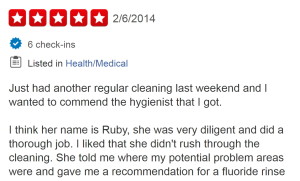 One of the hot terms in marketing these days is “persona.” The idea is to better understand your customers by creating profiles or personas. Research for these personas can get complicated, but here’s one that’s fairly easy to do: reading testimonials or reviews.
One of the hot terms in marketing these days is “persona.” The idea is to better understand your customers by creating profiles or personas. Research for these personas can get complicated, but here’s one that’s fairly easy to do: reading testimonials or reviews.
Three key elements to researching your audience are:
- Finding out what problems they’re trying to overcome
- Finding out what solutions they appreciate
- Discovering the language they use to talk about those problems and solutions
By reading testimonials, recommendations, reviews, and so on, you have an easy-to-access supply of this kind of information.
Now, it’s very likely you’re going to find a lot of obvious information. It wasn’t surprising to learn the following from testimonials about firms who conduct focus groups:
- Quality respondents are important
- Being flexible in the face of changing requirements is important
- Anticipating needs is valuable
While particular points may not be new, what’s important here is to tally up the number of times a point is made. Let the data help you rank what’s crucial to your audience. Maybe you hadn’t thought being flexible is as important as these testimonials suggest.
But the real value in reading these testimonials is to learn the language people are using to describe problems and solutions. Words are emotional triggers and you want to use those same words in your writing.
In the testimonials I researched, these were some common words and phrases:
- consistently reliable
- accommodating
- (I feel) cared for
- attentive
When you keep hearing similar phrases over and over, there’s a good chance that’s going to work in your copy.
While it’s easy to access hundreds or thousands of customer responses using the internet – testimonials, comments, reviews, social media, forums – the trick is to be specific. You need responses relevant to your business.
While I got fairly specific with market research firms that conduct focus groups, I’m sure that focus groups vary by country/region, or by industry. The testimonials about a firms in England may not be so helpful for a company in the US mid-west just as testimonials about a company specializing in pharmaceuticals may not help a company in automotive. Size of companies can make a difference too. If you’re a small company, reading testimonials from a large firm may not be as helpful in certain respects.
And you need to go through a lot of testimonials.
If you sample ones from just a few businesses, you’re going to skew your picture of the audience. You need to sample a large group to get a more accurate picture of what’s important.
And remember to pay attention to the pain points.
This is where you need to move beyond just testimonials on sites. Typically only positive responses make to a company’s website. By looking at comments or going to review sites, for example, you get the full range of people’s experiences and perceptions. Knowing what didn’t work for some people can be just as valuable as hearing what did.
What's Your Take?